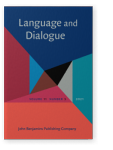Vol. 11:3 (2021) ► pp.405–432
“What I advise you to do is…”
Giving advice in Egypt. The case of university teachers
The current study aims to examine the realization of the speech act of advising among Egyptian university teachers. To this end, 50 Egyptian university teachers at a private university completed eight role-plays in which they gave solicited advice to their fellow teachers. The role-plays were recorded and later transcribed. The data were coded for the advising strategies as well as the initiators and internal/external modifiers. The results showed the participants’ preference for the use of direct advising. The results also showed a minimal influence for the advisor’s gender and years of teaching experience on the participants’ advising preferences. A major influence, however, was observed for the variable of social dominance as represented in the advisee’s academic rank. The results are interpreted in terms of the Mixed Game Model and earlier studies on the speech act of advising.
Article outline
- 1.Introduction
- 2.Theoretical framework
- 3.Literature review
- 3.1Monolingual studies on the speech act of advising
- 3.2Cross-cultural studies on the speech act of advising
- 4.Methodology
- 4.1Participants
- 4.2Data collection
- 4.3Data coding
- 5.Results
- 5.1What are the advising strategies Egyptian teachers prefer in teacher-teacher interaction?
- 5.2What is the effect of gender on the Egyptian teachers’ advising strategies in teacher-teacher interaction?
- 5.3What is the effect of academic rank on the Egyptian teachers’ advising strategies in teacher-teacher interaction?
- 5.4What is the effect of the years of teaching experience on the Egyptian teachers’ advising strategies in teacher-teacher interaction?
- 6.Discussion
- 7.Conclusion
-
References
